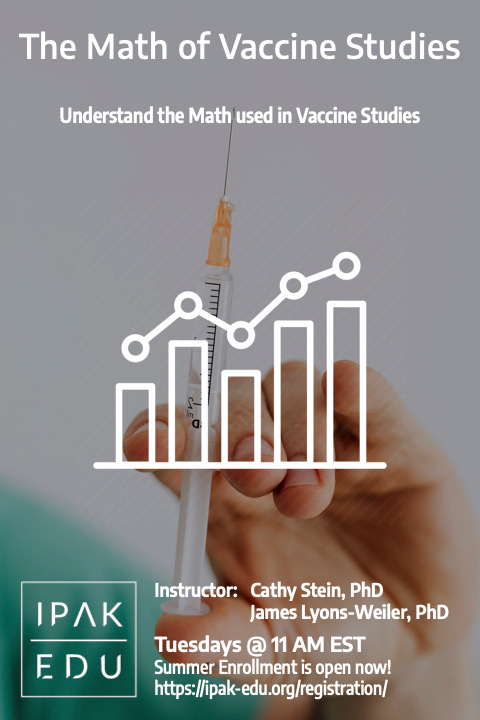Hammond: FDA Relied on Scientific Fraud to Authorize Pfizer's COVID-19 Vaccine for Infants and Toddlers
A Guest Post by Journalist Jeremy R. Hammond
I invited objective and ethical independent journalist Jeremy R. Hammond to share his latest in his series of newsletters summarizing how the FDA relied on scientific fraud to authorize Pfizer's COVID-19 vaccine for infants and toddlers. In this piece, he reports how the FDA attempted to justify its decision by exaggerating the risk to children from "Long COVID".
If you missed the prior newsletters in this series, you can read Part I here (introduction to the FDA's willful dishonesty), read Part II here (willful ignorance of natural immunity the very low risk to children), and read Part III here (lying about the risk of hospitalization).
Since it is widespread common knowledge that the risk to children of dying from COVID-19 is statistically zero, and the risk of hospitalization is also extraordinarily low, the FDA in its emergency use authorization decision memorandum highlighted the risk to children of Long COVID.
The FDA acknowledged that the data are "sparse" but cited a report from the UK Office for National Statistics finding that 7.2% of children who tested positive for SARS-CoV-2 reported continued symptoms at 12 weeks post-infection.
Thus, the FDA implies that seven out of every one-hundred children infected with the virus may develop Long COVID.
However, because that report was based on a survey of self-reported symptoms and was otherwise not methodologically sound enough to estimate the true rate of long-term symptoms in children attributable to SARS-CoV-2 infection, the UK report explicitly states, "It is not possible to infer from this analysis whether self-reported symptoms are caused by coronavirus infection."
That naturally didn't stop the FDA from fraudulently drawing precisely that inference in order to push its emergency use authorization through.
Estimates from such surveys or observational data of the proportion of people who develop persistent symptoms after SARS‑CoV‑2 infection are confounded by other causal or contributing factors, including the negative health effects of governments’ "lockdown" measures and the traumatism of simply having tested positive resulting from the persistent and intensive fearmongering about the risks from the virus emanating incessantly from the government and mainstream media over the course of the pandemic.
An article in JAMA in October 2020 astutely observed that the negative health effects of the government lockdowns and general trauma to the population needed to be differentiated from true cases of persistent symptoms caused by SARS-CoV-2 infection.
A study in Acta Paediatrica in April 2021 found that 43% of children previously diagnosed with COVID-19 reported one or more symptoms more than 60 days post-infection, but the authors emphasized that they lacked a control group and that their finding was confounded by the negative health effects of the lockdowns, and they therefore called for further studies to be done including a control group to estimate the true prevalence of Long COVID.
A study by German researchers on the preprint server medRxiv in May 2021 did include a control group and found no statistical difference when comparing the reported persistent symptoms of adolescents who tested positive for antibodies to SARS-CoV-2 with those who tested negative.
A study by Swiss researchers reported in JAMA in July 2021 found that 4% of children who tested positive for antibodies to SARS-CoV-2 reported at least one symptom lasting more than 12 weeks, which compared to 2% of children who reported persistent symptoms but had no evidence of prior infection.
A study by UK researchers on the preprint server Research Square in August 2021 found that 67% of children and adolescents reported persistent symptoms three months after having tested positive for SARS-CoV-2, but this compared with 53% of children who tested negative. As the authors appropriately noted, "it is unclear whether the features associated with Long COVID are related to the viral infection or the effects of the pandemic, lockdown and school closures with consequent social isolation."
A particularly illuminating study by French researchers in JAMA Internal Medicine in November 2021 found reported persistence of symptoms to be associated with the mere belief among subjects that they had previously been infected with SARS-CoV-2. With the sole exception of loss of taste or smell, they found no significant difference in the rate of self-reported symptoms between individuals who had evidence of prior infection and those who believed they had been infected but tested negative for antibodies.
The authors appropriately concluded that "persistent physical symptoms after COVID-19 infection may be associated more with the belief in having been infected with SARS-CoV-2 than with having laboratory-confirmed COVID-19 infection." They further cautioned that practitioners should do a careful medical evaluation so as not to erroneously attribute symptoms to "Long COVID".
A systematic review and meta-analysis published in the Journal of Infection in November 2021 found an inverse association between the quality of studies and estimated prevalence of Long COVID in children: specifically, the higher the quality of the study, the lower the estimated prevalence.
Narrowing their analysis to only those studies that included a control group, they found that the frequency of most persistent symptoms reported by people who tested positive for SARS-CoV-2 was similar to that reported by people who tested negative. The authors appropriately concluded by emphasizing the importance of including a control group so as not to artifactually inflate the prevalence of Long COVID in the childhood population.
In sum, the FDA’s reliance on a single source from which it is logically "not possible to infer" whether the self-reported symptoms were caused by SARS‑CoV‑2 infection to willfully mislead people into the belief that more than 7 percent of children infected may develop Long COVID is just another illustration of how the agency serves the pharmaceutical industry by engaging in deliberate fearmongering and scientific fraud.
Furthermore, even if we were to assume for the sake of argument that over 7 percent of children do develop Long COVID, the FDA failed to produce any data to support its assumption that vaccination would reduce that risk.
The FDA acknowledges this failure, noting understatedly in its "limitations" section that "available data are not conclusive on the effectiveness of COVID‑19 vaccines currently in use against long-term sequelae of COVID‑19 among individuals who are infected despite vaccination. Additional evaluation is needed to assess the effect of this vaccine in preventing long-term effects of COVID‑19, including data from clinical trials and from the vaccine’s use post-authorization."
To justify its authorization of the vaccine for infants and toddlers, the FDA simply assumed that it would be protective against persistent symptoms following breakthrough infection -- once again, a faith-based and not evidence-based approach.
In my next newsletter, I'll go over how the FDA misled about the risk of myocarditis from COVID-19 versus the risk of myocarditis from COVID-19 vaccination.
Wow. Jeremy is spot-on, and thorough. I would like to suggest that all of my readers head to JeremyRHammond.com and sign up for his free newsletter for more content like this, that would be perfect. Each of the newsletters in this series is a summary version of a section of the major paper he is working on, which he will be publishing as a downloadable e-book, so subscribers can also stay tuned for that more extensive and fully referenced version.






Is there any reason people don't organize continuous protests in front of Pfizer and Moderna offices around the world?
With 'Baby Killer' signage ...
They did this for returning Vietnam vets....
"I'll go over how the FDA misled about the risk of myocarditis from COVID-19 versus the risk of myocarditis from COVID-19 vaccination."
Since everyone will be exposed to covid, then it's a logical error to compare risk of something from covid v. risk from vaxx. The question is rather whether the vaxx ADDS to the risk of something from covid.
Clare Craig got it right.
https://dailysceptic.org/archive/heart-problems-after-covid-are-much-worse-for-the-vaccinated-nature-study-shows-but-its-hidden-in-the-appendix/